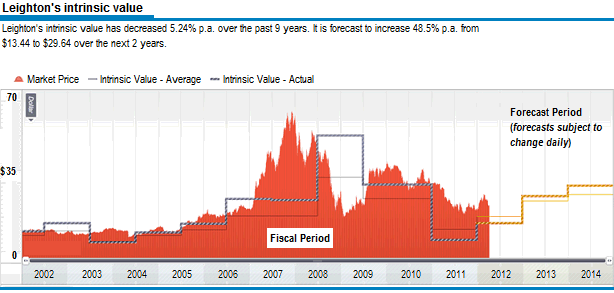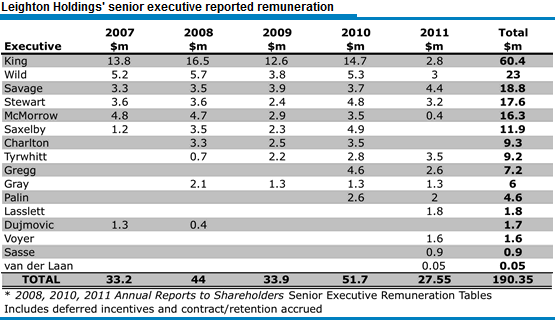They may never be needed but are there enough?
 Republished: PORTFOLIO POINT: Leighton’s recent performance issues have been exacerbated by a poor relationship between management and staff.
Republished: PORTFOLIO POINT: Leighton’s recent performance issues have been exacerbated by a poor relationship between management and staff.
The 15th of April will mark the 100-year anniversary of the tragic sinking of the Titanic on its maiden voyage from Southampton England to New York. Owned by The Oceanic Steam Navigation Company or White Star Line of Boston Packets, the tragedy was not that her advanced safety features, which included watertight compartments and remotely activated watertight doors malfunctioned. The tragedy was the operational failure and that the Titanic lacked enough lifeboats to accommodate any more than a third of her total passenger and crew capacity.
It occurred to me on this anniversary that there are many lumbering, giant business boats listed on the Australian stock exchange today, whose journeys have been equally eventful, if not fatal, and whose management is no less responsible for operational failures and for providing lifeboats only for themselves.
Take the situation over at Leighton (ASX: LEI) – a company I wrote about here some time ago, saying: “There is a significant risk of downward revisions to current forecasts for the 2012 profit.” On March 30, the company wrote a further $254 million off its two biggest projects – Airport Link and the Victorian desalination plant. More broadly, Leighton downgraded its FY12 profit guidance to $400 million-$450 million from $600 million-$650 million, taking the company’s writedown tally to almost $2 billion in the past two years. This will reduce the return on equity from 22% to 15% for 2012, and significantly reduce the 2012 intrinsic value, which now sits below $14.00 (see graph below).
Source: Skaffold.com
Back when I wrote my prediction, I also noted that workers at the desalination plant had cited ‘safety concerns’ causing them to work more cautiously (read slowly) to ensure their physical safety and the safety of their $200,000 per year wage, which of course would not continue beyond the project’s completion.
This week, it was revealed that similar problems have emerged at Brisbane’s Airport Link project. According to one report, “an increasing level of aggressive behaviour” from unionised workers who wanted to “get paid for longer” was an attempt to “leverage this finishing phase” of the project.
Leighton must construct to a deadline, and liquidated damages clauses cost the company about $1.1 million per day for every day that the Airport Link project is delayed. My guess is that as a result of the workforce’s alleged ‘go slow’, Leighton is forced to bring in hundreds of sub-contractors such as sparkies (with “specialist commissioning skills and experience”, according to John Holland) to complete the work. Either way, it costs Leighton more. A 25% blow-out on a multi-billion dollar project can amount to $1 billion.
On top of these problems, Leighton has a $200 million deferred equity commitment to make two years after Airport Link opens. And if my speculation that the operator may be broke before Christmas comes to fruition, Leighton will be forced to write off another $63 million – the amount remaining to be written down.
But before you jump to attack the unions reported to be responsible for Leighton’s woes – something I believe is often justified, not because of what the unions represent, which is honourable, but because of the tactics they sometimes use to seek redress – you should remember that there are many companies whose more humble management works in harmony with its workforces, unionised or otherwise.
Management is an important part of the investment analysis mix and while I firmly believe, as Buffett does, that the business boat you get into is far more important than the man doing the rowing, I do also believe that management will make the bed that ultimately every stakeholder must lie in.
Any company whose management drives flash cars to the office, pays herculean salaries to themselves and/or takes advantage of company relationships for self-gain is always going to be the target of unrest and distrust from its staff. This is driven often by envy, a sense of unfairness or lack of equity, and while I am not saying this is the case at Leighton, clearly there’s something amiss that is the root cause of this much trouble.
Over the last decade, Leighton has generated cash flow from operations of $8.3 billion, but its capital expenditure has now exceeded $7.5 billion. This would leave $800 million for dividends, but the company has paid dividends of over $2 billion (perhaps to appease non-unionised, income-seeking shareholders who support the share price upon which management’s lucrative remuneration is based). Given the cash to fund this dividend largesse was not generated by business operations, $850 million of ownership-diluting equity has been raised and $1.3 billion of debt borrowed. And for this less-than-spectacular performance, the top 10 current executives were paid almost $20 million last year. Eight of those were paid more than $1.2 million in 2011, four were paid more than $2.3 million, and the year before, three of the 10 were paid more than $4.5 million each.
Forecast profits for 2012 will not be any higher than five years ago, and the company workforce has doubled to 51,281 employees at June 30, 2011. But $190 million in salaries for 15 senior executives (excluding van der Laan’s $47,000) between 2007 and 2011 (see table), while overseeing such performance does not sit well with staff (or vocal but ineffectual minority shareholders) and it’s the relationship between management and staff that is more than partly to blame for the company’s ills.
Whether or not the CFMEU’s Dave Noonan’s claim in The Australian Financial Review this week is correct – specifically that “the markets were the last to know [about Airport Link], everybody else in the industry knew that the company were going to drop hundreds of millions of dollars and obviously they chose to tell the stock market very late in the piece” – is less significant than whether a carcinogenic tumour has grown between management and staff. The former can be resolved but the latter is potentially more permanent, and therefore damaging to shareholder returns.
Leighton is a fixture in the portfolios of thousands of superannuants nearing retirement and their disappointment with their investment returns can be at least partly attributed to the poor wealth-creating contribution of this company and its management. In turn, this can be attributed to the motivation and satisfaction of staff.
Shareholders are also the owners and have a right to know how management is performing, but now the majority shareholder’s demands will hold sway and the majority shareholder is Spain’s Grupo ACS, not the many Australian super funds who thought the company’s management was working for them. Oh, and I am guessing there is the risk of further writedowns on projects that haven’t yet hit the headlines.
Like the Titanic, where only the executives at White Star Line were truly safe, minority shareholders may find there aren’t enough lifeboats for them either.
First Published at Eureka Report April 11. Republished and Posted by Roger Montgomery, Value.able author, Skaffold Chairman and Fund Manager, 19 April 2012.


Michael Leslie
:
YES – good relationships between management and staff are usually vital to business success. I am always impressed with those annual reports that make mention of these good relationships. Many companies make this a feature of their company culture. It takes years to build this trust and loyalty but is beneficial to all stakeholders. Think of Virgin (not QAN), ARP and SWL which come to mind.
Chadwick
:
My brother recently left leightons he told me about the write downs way before it was disclosed to market. He also said to expect more. This is a terrible investment. The quality of work is also huge issue coupled with a lack of staff training and supervision.
Peter
:
They [unions] have destroyed manufacturing in Australia, and their “noble” reasons for existence have been long forgotten. No wonder their membership is a fraction of what it once was.
Peter